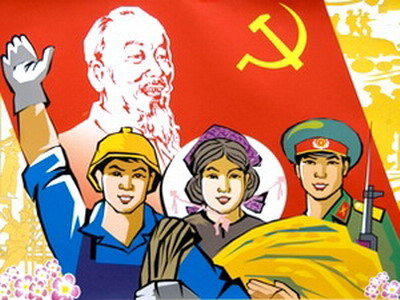CPV looks to sustainable development
VGP – Under the leadership of the Communist Party of Việt Nam (CPV), the country has promoted the renewal process and laid a firm foundation to become a modern industrial nation by 2020.
|
|
|
Illustration photo |
In the early stage of the 20th century, as the country was still under the domination of foreign colonialists and imperialists, people lived their lives in poverty and hardship. On June 5 1911, teacher Nguyễn Tất Thành (later Hồ Chí Minh) left Việt Nam to find a path for national salvation. In 1930, he founded the CPV, the vanguard of the Việt Nam working class.
President Hồ Chí Minh and the CPV led Vietnamese revolution to great victories against the colonial and half feudal system to open a new era of independence and socialism and against the neo-colonialism to regain unification. Under the leadership of the Party, Việt Nam also had initial success in its renewal process which was launched at the Party’s 6th National Congress in 1986. The renewal process is aimed at abolishing the mechanism of bureaucratic centralism with State subsidies, restructuring the economy and the management mechanism, building a multi-sector and socialist-oriented market economy, promoting the global integration, and expanding cooperation with other countries.
With great efforts, Việt Nam recovered from the domestic socio-economic crisis in 1996, the regional monetary crisis during the 1997-2000 period, and the global economic depression in 2008-2009. Over the past five years, Việt Nam has overcome numerous difficulties and challenges to stabilize the macro-economy, control the inflation rate, maintain a high growth rate, and escaped its underdevelopment.
The nation’s GDP is estimated at US $106 billion, a 100% increase compared to 2005, with per capita income reaching about US $1,200. Việt Nam went from a poor and starving country to become the world’s second biggest rice exporter with 6 million tons of rice shipped in 2010. The process of modernization and industrialization has helped Việt Nam upgrade its infrastructure. 250 industrial zones and various key economic regions are making Việt Nam become a modern industrial country.
Economic development is not only the basis and condition for the achievements of social progress and equality but also helps resolve social issues and improve people’s living conditions. In addition, Việt Nam always attaches great importance to developing education and training, as well as science and technology.
At the United Nation Summit in 2010, to review the implementation of its Millennial Development Goals (MDGs), Việt Nam was considered one of the most successful countries which is able to achieve all of the goals by 2015.
Regarding hunger elimination and poverty alleviation, Việt Nam has been very successful with various socio-economic development strategies and practical measures such as the Government’s Decision 135 to help poor communes upgrade their infrastructure and Decision 134 to assist poor people with production land, houses and clean water. As a result, the poverty rate fell from 58% in 1993 to 9% in 2010.
The Party also focused on dealing with issues relating to agriculture and farmers by setting up a national target program to create new rural areas in which employment, population, healthcare service, the “Paying debts of gratitude” movement, epidemic prevention, environmental protection, and social welfare received much attention.
Since the renewal process was launched, the Party has ceaselessly tried its best to improve its political argument, reform the organizational and personnel work, learn and follow President Hồ Chí Minh’s moral example, strengthen the struggle against corruption and bureaucracy, improve the effectiveness of State management, ensure political, defense and security stability, and reinforce the national unity bloc.
In 2009, Việt Nam also fulfilled its mission as a non-permanent member of the UN Security Council. Joining the World Trade Organization in 2007, Việt Nam is now a trustworthy friend and partner of all countries and the international community.
2010 was considered a successful year for Việt Nam with a variety of major events being celebrated. The country fulfilled its mission as ASEAN Chair with organization of 16th and 17th ASEAN Summit which drew the participation of not only ASEAN members but also important partners such as Russia and the US.
The 11th National Congress of the Communist Party of Việt Nam (CPV), held in January 2011, has engaged in energetic, frank and democratic discussions and unanimously adopted documents of great importance and strategic significance both in the long-term and in the immediate future for the country’s development: The Platform for national construction during the transitional period to socialism (supplemented and developed in 2011), the Socio-economic Development Strategy for the 2011-20 period, orientations and tasks for the 2011-15 period and the Party Statute (supplemented and revised).
The documents adopted at this congress are profound theoretical and practical summarization of 20 years of implementing the Platform, 10 years of implementing the Socio-economic Development Strategy (2001-10), 25 years of implementing the renewal process and five years of implementing socio-economic tasks and directions (2006-10).
Communist Vietnamese people are proud of their great achievements. However, there are still shortcomings, such as the unsustainable development, the weaknesses in education and training, science and technology, culture and society, and environmental protection. Bureaucracy and corruption have not been completely eliminated and there remain shortcomings in the building of the Party.
A ruling Party should never be satisfied with what it achieved. It should admit its shortcomings and make great effort to improve itself for the development of the nation and for the benefit of the people. The 8th session of the 12th National Assembly took place with a high sense of responsibility in an ebullient and democratic atmosphere. The Party, the Government, the National Assembly and the whole population of Việt Nam will join hands to discuss and decide the nation’s issues to motivate sustainable development./.


